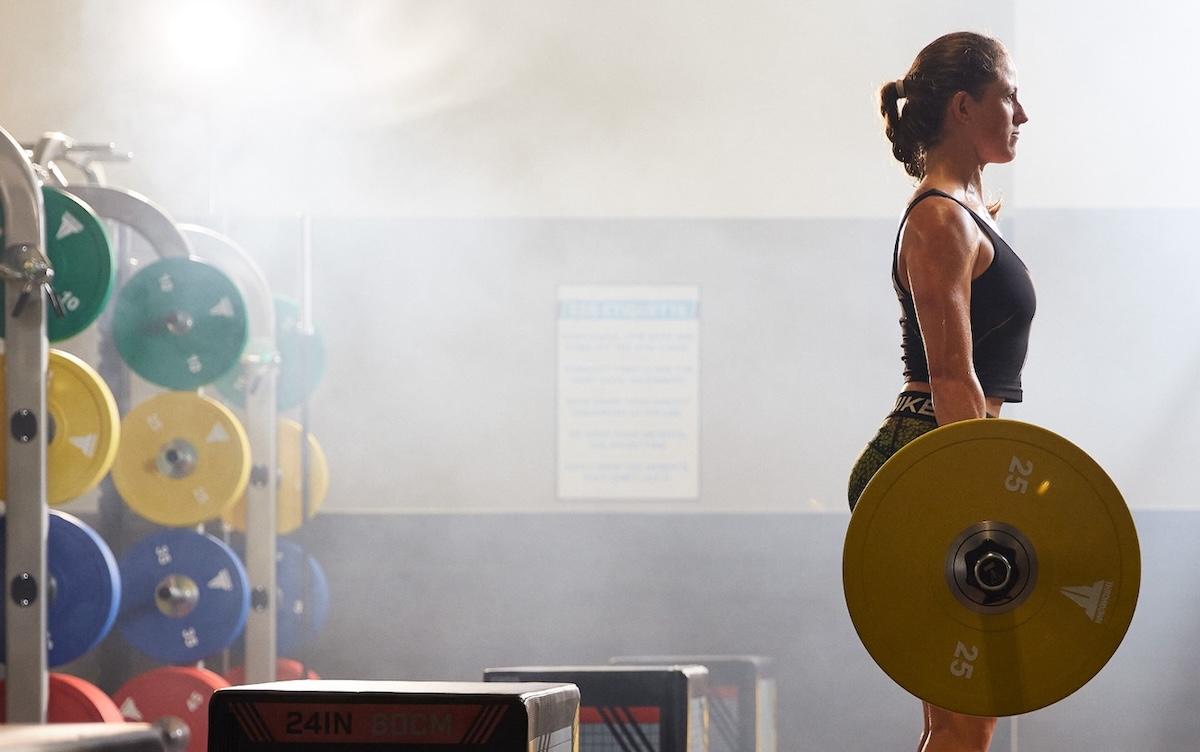DOES LIFTING WEIGHTS MAKE WOMEN BULKY? WHAT EVERY WOMAN SHOULD KNOW
Lifestyle
Nutrition
Sep 15, 2025 • 6min read
Lifting heavy and looking bulky are often linked together but rarely based in fact. The truth is that strength training does incredible things for your body and creating a “bulky” physique isn’t one of them. This blog will break down where the myth came from, the true impacts of lifting heavy and how embracing your strength can lead to the lean, empowered physique you’ve been working toward.
WHY PEOPLE THINK LIFTING HEAVY = GETTING BULKY

- It’s time to unravel the fear. Women are often told the same outdated story: light weights and excessive cardio are the keys to looking “toned.” But what really fuels the “bulky” myth? Misunderstanding and outdated fitness culture.
- The myth comes from a misunderstanding of how muscle is built: Muscle doesn’t appear overnight. It takes consistent training, intentional caloric surplus and time. Lifting heavy a few times a week won’t make you bulky. Think of it as a way to compound the effects of your training
- Women have significantly lower testosterone than men: Testosterone plays a significant role in building muscle size. Since women naturally produce less of it than men, their ability to gain large amounts of muscle mass is biologically limited.
- Building visible muscle mass takes years of targeted training and nutrition: The physiques you see on bodybuilders are the result of long-term, structured programs with precise diets. That’s a totally different commitment than a few weekly sessions. If you’ve been told lifting equals bulk, you’re not alone. Break through more common misconceptions in this myth-busting guide to weight lifting.
- Media and outdated fitness culture pushed cardio-only workouts for women: Magazine covers, fitness DVDs and other mass media produced the product marketing-led misconception: cardio burns fat and lifting makes you big. Since then, sport science has taken a larger hand in the development of fitness culture and thankfully, is rewriting that story.
- “Bulky” is often confused with strong, defined or muscular: What some call “bulky” is lean muscle, definition-tight arms, strong glutes and a toned back. That’s the look many are after.
- Lifting heavy doesn’t mean lifting like a powerlifter: You can challenge yourself with weights without aiming for competition-level strength. There are weights for everyone, and what is heavy for someone else is different from what it is for you. Challenge yourself comfortably.
WHAT ACTUALLY HAPPENS WHEN WOMEN LIFT HEAVY WEIGHTS
If lifting heavy won’t make you bulky, what does it do? Turns out—it does a whole lot of good. Here’s what to expect when you commit to strength training with intention and consistency.
- Builds lean muscle that helps burn fat around the clock: Muscle is metabolically active—it burns more calories at rest than fat. That means your body becomes more efficient at fat-burning even when you’re not working out. More muscle = a higher resting metabolic rate. This helps your body process calories more effectively, supporting long-term weight balance.
- Improves posture, balance and joint stability: Strength training targets key muscles that support your spine, hips and knees—helping you move better, stand taller and avoid injury.
- Increases strength without dramatically increasing muscle size: You’ll feel stronger in your workouts and daily life—without looking “bulky.” Most women develop a sleek, athletic build when lifting regularly.
- Strength translates to confidence—inside and outside the gym: There’s nothing like hitting a new personal best or lifting something heavy with ease. That strength shows up everywhere in your life.
WHY WOMEN SHOULD LIFT WEIGHTS—NO MATTER THEIR GOALS
No matter your health goals and what you’re looking to accomplish in the gym, weight lifting should be in your routine. Here’s why lifting is one of the smartest long-term decisions for your health.
- Helps maintain bone density and prevent injury: Lifting puts healthy stress on your bones, giving you strength beyond what’s visible and preparing you to be healthy long into the future.
- Supports hormonal balance and metabolic health: Strength training helps balance key hormones like insulin and cortisol, quietly supporting your health and how you feel from the inside out. It can steady your energy, ease stress and improve sleep. Lifting can also benefit your heart.
- Reduces risk of age-related muscle loss: Muscle mass naturally declines after age 30. Lifting is your best defense against losing strength and independence over time.
- Strengthens mental resilience and self-esteem: Lifting builds more than muscle—it boosts your mood and gives you a powerful sense of accomplishment.
- Makes daily activities easier: Everyday strength and health matters. Lifting can lead to improved cardiovascular health. Making everyday movements easier, like carrying a suitcase, climbing stairs or getting off the floor all get easier when you train smart.
- It’s never “too late” or “too early” to start: Strength training is safe and effective at every age and fitness level. Start where you are and build a base. Go at your own speed and see yourself progress.
HOW TO START A WEIGHTLIFTING ROUTINE FOR WOMEN
Ready to lift but not sure where to begin? Starting a weightlifting routine is less daunting than you think. You don’t need to be a pro. You can build a plan, learn from those around you and try something new. Just take the first step.
- Start with machines or dumbbells: Start with whatever feels comfortable and build confidence while minimizing injury risk.
- Focus on full-body compound movements: These exercises work multiple muscle groups, helping you get stronger faster. Still deciding where to begin? This quick comparison of free weights and machines can help you find what fits you best.
- Use progressive overload: Listening to your body by picking the correct weights safely while keeping your muscles challenged will lead to improved strength that you can feel.
- Include rest days: Recovery is key, allowing muscles to rejuvenate and develop.
- Aim for 2–3 strength sessions per week: Consistency is key; feel free to start small. Even two days a week can deliver results.
Sample Beginner Routine
This three-day beginner split is designed to help you ease into lifting with structure and purpose. Each day focuses on major muscle groups, setting the stage for total-body strength and confidence.
- Day 1: Lower Body (squats, glute bridges, leg press) These moves target your glutes, quads and hamstrings, building lower-body power and helping you feel stronger in everyday movements, from walking up stairs to carrying groceries.
- Day 2: Upper Body (rows, overhead press, dumbbell chest press) This day hits your back, shoulders and chest. It helps improve posture and, upper-body strength..
- Day 3: Full Body (deadlifts, lunges, planks, bicep curls) These exercises work your entire body—building core strength, improving coordination and helping tie all your training together.
This routine is a solid base and it’s only the beginning. Adjust reps, weights, or exercises based on your goals as you get more comfortable. Your path to strength is your own; this is just the first step. Want even more structure for your strength days? Explore this full-body strength training routine designed to help you level up at your own pace.
DEBUNKING THE “BULKY” FEAR ONCE AND FOR ALL

Still worried about looking too muscular? Let’s put this fear to rest with a final myth check. Here’s why strength training shapes your body, not in ways that make you bulky, but in ways that make you unstoppable.
- Women who lift heavy don’t automatically gain mass: Strength training tones and defines more than it adds size.
- Diet, hormones and program design determine physique: What you eat, how you train and your genetics matter more than the weight you lift.
- “Bulky” is a personal perception, not an automatic outcome: Everyone has a different idea of what bulky means. Most won’t get there without years of intense precision.
CONCLUSION: STRONG IS THE NEW CONFIDENT
There’s nothing bulky about being powerful. When you lift heavy, you build a leaner, stronger and more confident version of yourself. The myths are outdated and your goals are just getting started.
Ready to prove strength is your superpower? Claim your 7-Day Free Trial today and start lifting heavy with confidence!






